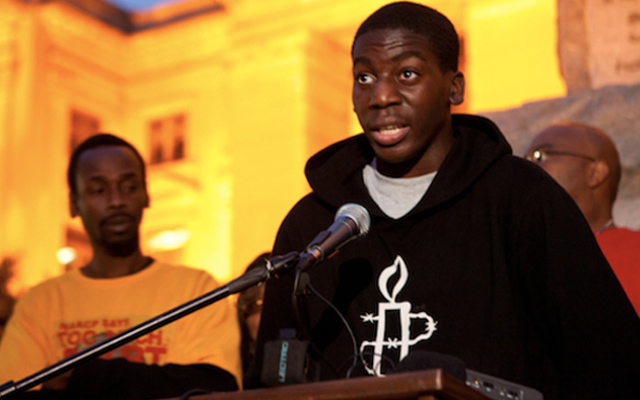
By Antone’ De’Jaun Davis-Correia, AIUSA National Youth Death Penalty Abolition Advocate
Caught at the wrong time, in what shouldn’t have been the wrong place, the case of Trayvon Martin still resonates with me. It happened to someone close to my age, someone that looks like me, it happened not too far from where I live. It demonstrates that even being home is not safe for African Americans, for young men of color like me and others across the country.
Trayvon was seen as a threat. The message that this highlights is that you become a suspect just by what you look like. It makes me fear walking down the street, having a conversation on my cell phone, as a young person of color, you are reminded that you have to be aware of your surroundings at all times. Race is still a big issue in this country and can condemn you within our criminal justice system as both victim and suspect.
I’ve spent the last 7 years of my life, going through the justice system with my uncle Troy Davis. Even after his execution on September 21, 2011, my family and I have continued to speak out against the flaws of a racial charged system. On the same week as the George Zimmerman verdict, an African American mother in the same state of Florida was sentenced to 20 years for firing warning shots as she feared for her life.
Is equal justice possible in America, when the system disproportionately impacts people of color? When outcomes are so dependent on access to funds, to get the best lawyers, can overworked public defenders be counted on to give their poor, black clients the best?
I believe the only way to fight against ignorance and a flawed system is education and movement building. It is especially important that young people know their human and civil rights for when they are approached by police or private citizens. With education and using our collective voice against discrimination, we can help make the change so that there are no more Trayvon Martins or Troy Davises.
The United States has ratified both the International Covenant on Civil and Political Rights and the Convention on the Elimination of all Forms of Racial Discrimination, and yet the reality of our justice system is far from these ideals. The trial of George Zimmerman for the killing of Trayvon Martin opens a discourse about the entrenched discrimination in our society, and emphasizes the urgency of addressing the injustice of racial bias.
The U.S. Department of Justice is currently investigating Trayvon Martin’s death. Regardless of their findings, this investigation is vital in acknowledging the larger issues of pervasive racial discrimination in our justice system, and in ensuring that the human rights of victims and suspects are fully upheld in future trials.
It is a human right to not be discriminated against based appearance and to live a life unthreatened by what you look like. Unfortunately, this right is often denied.
Please take action to help end this violation. The End Racial Profiling Act, recently introduced in Congress, is key in ending institutionalized discrimination, and is an essential step towards ensuring equal justice for all. By calling your representative and asking them to support this legislation, you help America move one step closer to its founding ideals of justice and equality.
I want to let Trayvon’s mother know, I’m on her side, that I will not stop fighting and searching for justice. State by state and city by city, we will make this happen. I want to make sure I leave my imprint on society, that my actions bring us closer to realizing the mission of Amnesty International, that everyone can fully enjoy all their human rights.
Please join us to make this a reality.
